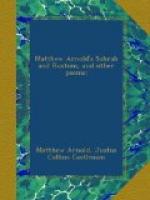‘There are our young barbarians all at play!’
And yet, steeped in sentiment as she lies, spreading her garments to the moonlight, and whispering from her towers the last enchantment of the Middle Age, who will deny that Oxford, by her ineffable charm, keeps ever calling us nearer the true goal of all of us, to the ideal, to perfection—to beauty, in a word, which is only truth seen from another side?... Home of lost causes and forsaken beliefs and unpopular names and impossible loyalties! what example could ever so inspire us to keep down the Philistine in ourselves, what teacher could ever so save us from that bondage to which we are all prone, that bondage which Goethe, in his incomparable lines on the death of Schiller, makes it his friend’s highest praise ... to have left miles out of sight behind him: the bondage of ’was uns alle baendigt, Das Gemeine’?”
=20.= Compare with Lowell’s lines on June, in The Vision of Sir Launfal.
=22-23.= Explain.
=24. Once pass’d I blindfold here.= That is, at one time I could have passed here blindfolded, being so familiar with the country. Can you think of any other possible interpretation?
=26-30.= Explain.
=31-40.= Compare the thought here to that of Milton’s Lycidas, ll. 23-38. A comparison of the two poems entire, in thought and structure, will be found to be both interesting and profitable. =Shepherd-pipe= (l. 35). The term =pipe=, also reed (l. 78), is continually used in pastoral verse as symbolic of poetry and song. [206]
=38-45. Needs must I lose them=, etc. That is, I must lose them, etc. Arnold’s great ambition was to devote his life to literature, which circumstances largely prevented; while Clough was eager to take a more active part in life, not being content with the uneventful career of a poet, =irk’d= (l. 40). Annoyed; worried. =keep= (l. 43). Here used in the sense of remain, =silly= (l. 45). Harmless; senseless. The word has an interesting history.
=46-50=. Like Arnold, Clough held lofty ideals of life, and grieved to see men living so far below their privileges. This, with his loss of faith in God, tinged his poetry with sadness. The storms (l. 49) allude to the spiritual, political, and social unrest of the last of the first half, and first of the last half, of the nineteenth century.
=51-60. So ... So....= Just as the cuckoo departs with the bloom of the year, so he (Clough) went, l. 48. =With blossoms red and white= (l. 55). The white thorn, or hawthorn, very common in English gardens.
=62. high Midsummer pomps=. Explained in the following lines.
=71. light comer=. That is, the cuckoo. Compare
“O
blithe New-comer.”
—WORDSWORTH,
Lines to the Cuckoo.
=77. swains=. Consult dictionary.
=78. reed=. See note, l. 35 of poem.




